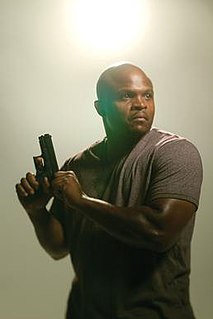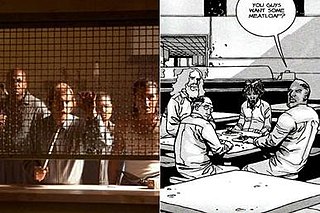
Paycheck is a 2003 American science fiction action film directed by John Woo. Written by Dean Georgaris, it is based on the 1953 short story "Paycheck" by Philip K. Dick. The film stars Ben Affleck, Uma Thurman, Aaron Eckhart, Paul Giamatti, Michael C. Hall, Joe Morton, and Colm Feore. The film was released on December 25, 2003, by Paramount Pictures in North America and DreamWorks Pictures internationally, to negative reviews but was a commercial success, grossing $117.2 million on a $60 million budget.
A time viewer is a hypothetical device, often featured in works of fiction, that can display events occurring in another time, usually in the past but also in the future.

Of Ducks, Dimes and Destinies, or Of Ducks and Dimes and Destinies, is a 1995 Scrooge McDuck comic by Don Rosa. Even though it was not originally a part of Rosa's The Life and Times of Scrooge McDuck, it became known as Part 0.
"Synchrony" is the nineteenth episode of the fourth season of the American science fiction television series The X-Files. It was written by Howard Gordon and David Greenwalt and directed by James Charleston. The episode aired in the United States on April 13, 1997 on the Fox network. The episode is a "Monster-of-the-Week" story, a stand-alone plot which is unconnected to the series' wider mythology. "Synchrony" earned a Nielsen rating of 11.3, being watched by 18.09 million people upon its initial broadcast. The episode received mixed to positive reviews from television critics.

"Demons" is the twenty-third episode of the fourth season of the American science fiction television series The X-Files. It premiered on the Fox network in the United States on May 11, 1997 and in the United Kingdom on BBC One on February 25, 1998. It was written by R. W. Goodwin and directed by Kim Manners. The episode helps explore the series' overarching mythology. "Demons" received a Nielsen rating of 11.8, being watched by 19.1 million viewers in its initial broadcast. The episode received mostly positive reviews from television critics, with many complimenting the episode's look in Mulder's mind.
"Monday" is the fourteenth episode of the sixth season of the science fiction television series The X-Files. It premiered on the Fox network on February 28, 1999. It was written by Vince Gilligan and John Shiban, directed by Kim Manners, and featured guest appearances by Carrie Hamilton and Darren E. Burrows. The episode is a "Monster-of-the-Week" story, unconnected to the series' wider mythology. "Monday" earned a Nielsen household rating of 10.2, being watched by 16.7 million people in its initial broadcast. The episode received positive reviews from television critics.
"'Somehow, Satan Got Behind Me" is the twenty-first episode of the second season of the American crime-thriller television series Millennium. It premiered on the Fox network on May 1, 1998. The episode was written and directed by Darin Morgan, and featured guest appearances by Bill Macy, Dick Bakalyan and Alex Diakun.
"Baggage" is the twenty-first episode of the sixth season of the American medical drama House. It aired on May 10, 2010. The episode deals with Dr. Nolan trying to help House by getting him to recount the events of the past week. The critical response was generally positive.
"Unplanned Parenthood" is the fifth episode of the seventh season of the American medical drama House. It first aired on October 18, 2010.

Theodore "T-Dog" Douglas is a fictional character from the horror drama television series The Walking Dead, which airs on AMC in the United States and is based on the comic book series of the same name. He was created by series developer Frank Darabont and was portrayed by IronE Singleton. The character was introduced in the first season as a member of the group that series protagonist Rick Grimes encounters in Atlanta. T-Dog was portrayed as a well-intentioned and kindhearted man towards his fellow survivors, although he struggles to prove his worth in the group. The character eventually adapts to the group and becomes one of Rick's right-hand men.

Merle Dixon is a fictional character from the horror drama television series The Walking Dead, which airs on AMC in the United States. He was created by series developer Frank Darabont and was portrayed by Michael Rooker. The character was first introduced in the first season as a Southern redneck hunter who has a younger brother, Daryl. He is misogynistic and racist, which causes tensions between him and his group of survivors. Following an encounter with series protagonist Rick Grimes, Merle disappears and joins the community of Woodbury, Georgia, where he becomes the right-hand man of The Governor. He becomes caught in the conflict between the Governor and Rick, especially when nobody in Rick's group wants him in the group, except for Daryl.
"The Rooster Prince" is the second episode of the first season of the FX anthology series Fargo. The episode aired on April 22, 2014 in the United States on FX. It was written by series creator and showrunner Noah Hawley and directed by Adam Bernstein. The title refers to the Jewish parable of the same name.

"A Muddy Road" is the third episode of the first season of the FX anthology series Fargo. The episode aired on April 29, 2014 in the United States on FX. It was written by series creator and showrunner Noah Hawley and directed by Randall Einhorn. The title refers to the Zen Buddhist kōan known as The Muddy Road.

"The Six Ungraspables" is the fifth episode of the first season of the FX anthology series Fargo. The episode aired on May 13, 2014 in the United States on FX. It was written by series creator and showrunner Noah Hawley and directed by Colin Bucksey. The title refers to the Zen Buddhist kōan known as The Six Ungraspables.

"The Heap" is the eighth episode of the first season of the FX anthology series Fargo. The episode aired on June 3, 2014 in the United States on FX. It was written by series creator and showrunner Noah Hawley and directed by Scott Winant. The title refers to the paradox in logic known as the paradox of the heap.

"Self Help" is the fifth episode of the fifth season of the post-apocalyptic horror television series The Walking Dead, which aired on AMC on November 9, 2014. The episode was written by Heather Bellson and Seth Hoffman, and directed by Ernest Dickerson. The episode centers on Abraham Ford, Eugene Porter, Rosita Espinosa, Tara Chambler, Glenn Rhee, and Maggie Greene, who have left the church and their fellow survivors to pursue a mission to Washington, D.C., by bus. Upon their journey, they encounter numerous problems, and Abraham's past and his keen desire to continue on the mission are explored throughout the narrative.

"Morton's Fork" is the tenth and final episode of the first season of the FX anthology series Fargo. The episode aired on June 17, 2014 in the United States on FX. It was written by series creator and showrunner Noah Hawley and directed by Matt Shakman. The title refers to a dilemma of the same name, posed in the episode by FBI agents Pepper and Budge.

The Prisoners are fictional characters from the comic book series The Walking Dead and the television series of the same name.

"Shut Up and Dance" is the third episode in the third series of the British science fiction anthology series Black Mirror. It was written by series creator and showrunner Charlie Brooker and William Bridges, and premiered on Netflix on 21 October 2016, together with the rest of series three.

"Hostiles and Calamities" is the eleventh episode of the seventh season of the post-apocalyptic horror television series The Walking Dead, which aired on AMC on February 26, 2017. The episode was written by David Leslie Johnson and directed by Kari Skogland.













